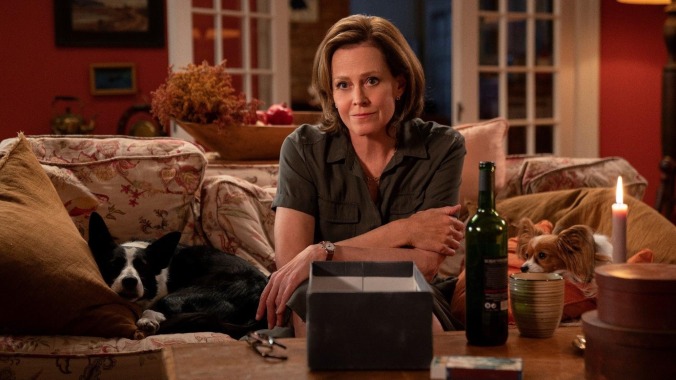Sigourney Weaver saves The Good House from being a teardown
Sip happens to Weaver and Kevin Kline in this broad, clunky dramedy about a small-town real estate agent with a taste for merlot
Film Reviews Sigourney Weaver
Whatever good there is to say about The Good House revolves around its luminous star, Sigourney Weaver. There are moments in Maya Forbes and Wally Wolodarsky’s new dramedy when you wonder why, despite two Golden Globe Awards, three Oscar nominations and four primetime Emmy nods, Weaver is not mentioned in the same breath as other lauded actresses of her time like Meryl Streep, who was originally slated to star in The Good House. Maybe she’s so closely associated with beloved genre movies like the Alien series, Ghostbusters, Galaxy Quest, and Avatar that we don’t fully value her strong dramatic work in films like Gorillas In The Mist and The Ice Storm.
Whatever the reason, it’s great to see Weaver top-line a film, especially one meant to lure those of a certain age back to the multiplex. It’s a shame, then, that The Good House isn’t entirely worthy of Weaver’s efforts. She plays Hildy Good, a 60-year-old real estate agent and self-deluded alcoholic trying to stay one step ahead of her personal and professional crises, one glass of merlot at a time. It’s a choice role for a category of actress rarely asked to star in an American film. But Forbes, Wolodarsky and Thomas Bezucha’s adaptation of Ann Leary’s 2013 novel wobbles along on clunky plot mechanics and the sharp turns that can occur when a film struggles to stuff an entire source material’s worth of incidents into two hours. To use vernacular Hildy might appreciate, The Good House tries to be floral on the nose with a bitter mouthfeel and a satisfying finish, but is not much better than a tasty bulk wine that blends light, small-town comedy with addiction-based drama.
The movie does take full advantage of Weaver’s imperious air and she effortlessly makes such an unlikeable and judgmental person worthy of our time. When we meet Hildy, she’s strutting around the quaint coastal town of Wendover, Massachusetts, with a realist’s wit and a lifer’s knowledge of every home and the secrets of those who live within. This allows her to use local gossip to her professional advantage while complaining with prickly elegance about the increasing number of homes selling to out-of-towners and the coffee that’s going for $4 a pop.
Behind the scenes, Hildy’s life is a mess: she’s financially supporting her two daughters, paying alimony to the husband who left her for another man, driving an SUV she can’t afford, and losing clients to Wendy (Kathryn Erbe), her main competition. Hildy is, in her words, in need of “a good year.” She’s also in need of a drink which became much harder to obtain after her family organized an intervention—or “the ambush” as Hildy calls it—18 months earlier. “Too bad the girls never met my mother, because then they’d know what a real alcoholic looks like,” Hildy says, as if earlier generations’ “pretend it’s not happening” attitude towards alcoholism makes her own behavior less burdensome to those around her. So naturally, rehab didn’t take and her aversion to AA is so strong that even the juicy real estate chitchat that dominates each meeting doesn’t compel her to attend.
During its more successful first half, the film operates as an ultra–WASPy Nancy Meyers comedy where contemporary, self-actualized women become frazzled by life’s hurdles. As cleanly lit as a Lifetime movie, Wendover is supposed to be one of those big screen hamlets that’s so fully realized they’re like another character. The town (with Nova Scotia filling in beautifully for New England) is North Shore-adorbs and populated by an overabundance of dimensionless townspeople who serve as targets for Hildy’s next witty remark. Only Rebecca (Morena Baccarin), as Hildy’s wine buddy and confidante, breaks through, although her extra-marital affair adds complications that we can’t bring ourselves to care about.
After much table-setting, the plot sputters into gear when Hildy runs into Frankie Getchell, a high school flame turned wealthy contractor dismissively referred to by her daughter Emily (Molly Brown) as “the garbage man.” Getchell is played by a not entirely believable, yet always lovable, Kevin Kline. He and Weaver have very little chemistry here despite having co-starred in 1993’s Dave and 1997’s The Ice Storm. “There was a time in my life when I was quite in love with Frankie Getchell, and you would’ve been too,” Hildy tells us by breaking the fourth wall, an already overused cinematic device that the film uses repeatedly. It works here because the wine fuels Hildy’s self-justification and the occasional acknowledgement that her life is falling apart, which she shares with no one except us. Her alcoholism, which is already the subject of townie whispers, becomes starkly obvious as the movie ditches its tart-tongued romcom charm and takes an awkward turn towards Hildy’s long-overdue reckoning. Towards the end, she falls to her knees in a meltdown so dramatic that the movie briefly forgets there are two people who’ve gone missing and who Hildy might have killed during one of her increasingly frequent blackouts.
If some of the faults of The Good House sound familiar, they mimic the ones in Forbes’ directing debut, Infinitely Polar Bear, where serious issues were also addressed with light quirkiness and heavy drama. That 2014 film, starring Mark Ruffalo, felt credible in the details of its main character’s issues. The Good House feels equally so, even if its truths must fight their way through a thicket of tones, subplots and jokes. Thankfully, Weaver is so forceful and present she can plow through the movie’s flaws until we fail to notice them. For a film about denial, that sounds about right.